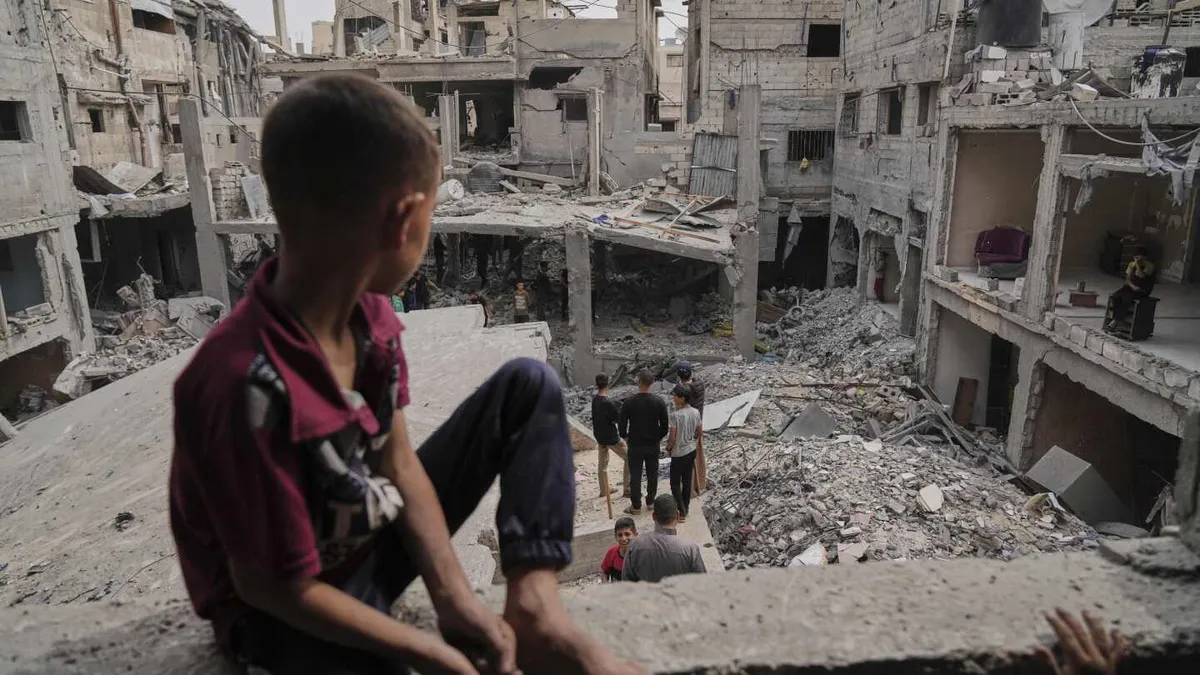
In a harrowing series of events, multiple airstrikes struck the southern city of Khan Younis in the Gaza Strip overnight into Thursday, resulting in the deaths of over 50 individuals. This devastating assault marks the second consecutive night of intense bombing in the region. Concurrently, another airstrike in northern Gaza claimed the lives of more than a dozen people, according to local authorities. These strikes coincide with U.S. President Donald Trump's visit to the Middle East, where hopes had been high for a potential ceasefire agreement or a renewal of humanitarian aid for Gaza.
The relentless bombing campaign has left the people of Gaza in a state of despair. An Associated Press cameraman reported witnessing 10 airstrikes on Khan Younis during the night. Numerous bodies were transported to the Nasser Hospital, where medical staff struggled to identify some victims due to the extent of their injuries. The hospital confirmed that 54 individuals had lost their lives, including a journalist from the Qatari television network Al Araby TV, who was killed alongside 11 family members in one of the strikes.
This recent escalation follows a previous night of airstrikes on both northern and southern Gaza, which resulted in at least 70 fatalities, including nearly two dozen children. In another tragic incident, an airstrike in Jabaliya, northern Gaza, targeted a complex housing a mosque and a small medical clinic, leading to 13 deaths, as reported by the Civil Defense, a first responder agency operating under Gaza’s Hamas-run government.
The personal stories emerging from Khan Younis are deeply heartbreaking. In Nasser Hospital, Safaa Al-Najjar was inconsolable as she was reunited with the shrouded bodies of her two children, 1.5-year-old Motaz Al-Bayyok and 1.5-month-old Moaz Al-Bayyok, who had perished in the airstrikes. Al-Najjar’s other five children, aged between 3 and 12, suffered injuries, and her husband remains in intensive care. Overwhelmed with grief, her son Yusuf, aged 11, cried out in anguish as he gazed upon his younger sibling's lifeless body. “I gave them dinner and put them to sleep as usual; it was a normal day. Suddenly, I don’t know what happened; the world went upside down,” she lamented as others sought to comfort her.
Outside the hospital, mourners gathered to pray as the deceased were laid out in white body bags, awaiting burial. The atmosphere was one of profound sorrow as the community came together to mourn their losses.
Israeli Prime Minister Benjamin Netanyahu has reaffirmed his commitment to escalating military operations in the Gaza Strip, aiming to dismantle the Hamas militant group. In a statement released earlier this week, he indicated that Israeli forces are poised to enter Gaza “with great strength” to fulfill the mission of “destroying Hamas.” This commitment has drawn international criticism, with Human Rights Watch expressing concern that Israel's plans could lead to further humanitarian crises, including potential displacement of hundreds of thousands of people.
The conflict escalated dramatically when Hamas-led militants conducted a deadly attack on October 7, 2023, claiming the lives of 1,200 people in southern Israel. Since then, Israeli retaliatory actions have resulted in the deaths of more than 53,000 Palestinians, a significant portion of whom are women and children, according to the Gaza Health Ministry. The intensity of the conflict has surged, particularly since the ceasefire was broken on March 18, with nearly 3,000 Palestinians reportedly killed since that date.
In a devastating blow to healthcare services, the European Hospital Khan Younis—the only facility in Gaza providing cancer treatments—has been rendered inoperable due to severe damage from Israeli airstrikes. The hospital director reported that the facility was struck twice on Tuesday, targeting a supposed Hamas command center located beneath the hospital. As a result, all specialized treatments, including cardiac surgeries and cancer care, have been halted.
On the day of the strikes, the hospital was treating around 200 patients, all of whom were gradually evacuated. The last 90 patients were transferred to other hospitals, including Nasser Hospital, on Wednesday morning. Efforts are now underway to coordinate repairs to the damaged facility.
The ongoing Israeli offensive has significantly damaged Gaza’s infrastructure, displacing approximately 90% of the population. Since March 2, 2023, Israel has imposed a blockade, halting the entry of all aid, including essential food and medication. International food security experts warn that Gaza is on the brink of famine unless the blockade is lifted and military operations cease. Nearly half a million Palestinians are facing potential starvation, while another million struggle to secure sufficient food, according to findings from the Integrated Food Security Phase Classification.
Human Rights Watch has called for action from the international community against Israel’s plans to seize Gaza, which they argue may amount to genocide. The rights organization also urged Hamas to release the hostages it still holds, as the conflict continues to escalate, leaving deep scars on the fabric of Palestinian society.